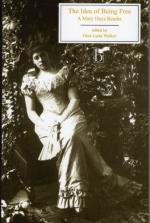|
This section contains 11,329 words (approx. 38 pages at 300 words per page) |

|
SOURCE: Sherman, Sandra. “The Feminization of ‘Reason’ in Hays's The Victim of Prejudice.” The Centennial Review 41, no. 1 (winter 1997): 143-72.
In the following essay, Sherman discusses The Victim of Prejudice as a departure from Hays's belief that reason was instrumental for achieving the independence of women.
Mary Hays's novel, The Victim of Prejudice (1799), is read alongside a cadre of “revolutionary” texts inspired by events in France, rebutting the Reflections of Edmund Burke (1790) which idealized patriarchalism.1 Yet its address to texts which challenged Burke, and aligned themselves with Mary Wollstonecraft's Vindication of the Rights of Woman (1792), is pessimistic, complicated by what Eleanor Ty terms a “change in climate by the end of the 1790s.” After the Reign of Terror and Napoleonic invasions, “no longer were the revolutionaries as optimistic in their belief in reason and the perfectibility of man as at the beginning of the decade.”2 Hays's rendering of “reason...
|
This section contains 11,329 words (approx. 38 pages at 300 words per page) |

|


